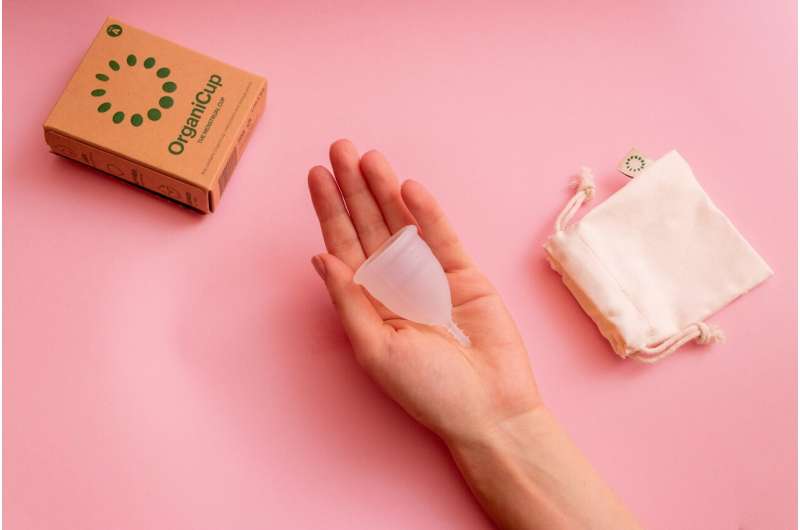This article has been reviewed according to Science X's editorial process and policies. Editors have highlighted the following attributes while ensuring the content's credibility:
fact-checked
peer-reviewed publication
trusted source
proofread
Menstrual cups can help prevent infection, improve vaginal health

Many girls in low- and middle-income countries struggle to buy products to manage their periods, which can cause them to skip school. So, ensuring they have access to menstrual products is critical.
A new Kenya-based study from University of Illinois Chicago researchers shows that the benefits of one kind of menstrual product—a menstrual cup—extend well beyond educational access. Teenage girls who were given menstrual cups were less likely to acquire certain kinds of vaginal infections and were more likely to have a healthy vaginal microbiome, the study found. The findings are published in PLOS Medicine.
The research followed 436 Kenyan secondary school girls, half of whom were given menstrual cups. They were tested every six months for bacterial vaginosis, a common type of infection, and at 12 months and 30 months for sexually transmitted infections. The researchers also tested participants' vaginal microbiome to determine the relative prevalence of beneficial and harmful bacteria.
At the end of the study, the girls with menstrual cups were 26% less likely to have bacterial vaginosis and were 37% more likely to have an optimal vaginal microbiome than the girls who didn't receive a cup. Overall, the menstrual cups did not appear to lower the risk of sexually transmitted infections, but when the researchers controlled for confounding factors, such as age and whether the girls were sexually active, they did see a decrease in STIs among those using a menstrual cup.
"The results showed that menstrual cups could be a game-changer in helping keep girls healthy," said Supriya Mehta, an adjunct professor of epidemiology and biostatistics in the School of Public Health at UIC and principal investigator on the study.
The study grew out of a conversation that Mehta had at a conference in Kenya in 2016 with Penelope Phillips-Howard, a professor at the Liverpool School of Tropical Medicine in the United Kingdom. At the time, Phillips-Howard had conducted an initial randomized trial looking at whether menstrual cups were effective at keeping girls in Kenya in school. As part of the study, the team tested for bacterial vaginosis and sexually transmitted infections, and she mentioned to Mehta that their results thus far suggested that menstrual cups were reducing infections.
Mehta believed she knew why—because menstrual cups help maintain a healthy microbiome during menses. "If your vagina is healthy, then it's more resilient to STI pathogens," she explained.
With this hypothesis, Mehta and her co-authors were able to create a sub-study looking at the biological impact of menstrual cups that was nested within a larger study of 4,000 girls upon which Phillips-Howard was embarking.
There are a few reasons that menstrual cups are more beneficial to vaginal health than other menstrual products, Mehta explains. The cup, which is bell-shaped and made from medical-grade silicone, is inserted into the vagina, where it collects blood. Tampons, on the other hand, don't take the blood out of the vaginal vault, and this iron-rich setting can be welcoming to the bacteria that cause bacterial vaginosis. The cups are also better than tampons at maintaining an acidic environment, which is a deterrent to infections. As for sanitary pads or reusable cloths that are worn too long or not cleaned properly, they can end up transferring bacteria into the vagina.
"These are all challenges that menstrual cups address," Mehta said.
The study was conducted in Kenya because of the link between menstrual products and staying in school, and because of an additional potential benefit given that 10% of 15-year-olds there reported having exchanged sex for sanitary pads. Yet, Mehta sees the results as relevant in higher-income countries, too. She hopes the study is repeated elsewhere to assess these benefits. Beyond the health benefits for women in countries like the U.S., she also thinks menstrual cups would be particularly helpful for groups such as homeless women.
The researchers plan to continue this study for another year. Mehta is also launching a second study focused on sex workers in Kenya, which is a particularly vulnerable group. Because they can't stop working when they are menstruating, they often engage in risky behaviors to manage their periods, have to charge less or don't get paid at all. Mehta will also study the impact of giving sex workers menstrual cups, one style of which can be worn unobtrusively during sex.
Other researchers on the study include Stefan Green, formerly of UIC, and Runa Bhaumik, research assistant professor in the College of Medicine at UIC, who is co-investigator of the sex worker study.
More information: Supriya D. Mehta et al, Analysis of bacterial vaginosis, the vaginal microbiome, and sexually transmitted infections following the provision of menstrual cups in Kenyan schools: Results of a nested study within a cluster randomized controlled trial, PLOS Medicine (2023). DOI: 10.1371/journal.pmed.1004258


















